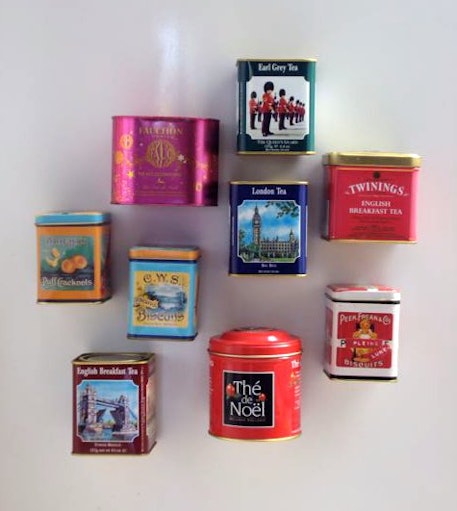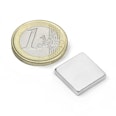
Hang up tea caddies
Tea caddies don't have to be hidden in a dark cupboard!
Online since: 02/06/2009,
Number of visits: 241693
1
Mounting with magnets
I had a decorative idea on how to display my collection of tea caddies on a wall:
I placed a block magnet Q-15-15-03-N
on the inside of each caddy.
That works great even without adhesive since these are sheet iron caddies.
Then I mounted an inconspicuous iron bar on the wall and placed the caddies along the bar.
The magnets are so strong that they adhere to the bar through the tea caddies.
Mounting with self-adhesive magnetic dots
Addition by customer Linda Teders, Purmerend (Netherlands):
I used the side of my fridge for hanging up tea caddies with self-adhesive magnetic dots.
Contrary to the application above, I wanted a solution where I can attach the magnets to the outside of the caddies.
I wanted to stay away from glue, in case I needed to use the tins for something else.
Finally, I came across these self-adhesive magnetic dots that can be easily attached and removed.
Because the lid of the tea caddy is not completely flat, I could not attach the self-adhesive magnetic dots in size 30 x 30 mm
directly to the tin itself.
There would not have been sufficient contact between the fridge and the magnetic dot.
To get around this problem, I cut 2mm thick foam tape to size and stuck it to the back of the tin, one piece each on the top and bottom.
Then I pressed the magnetic dots onto the foam tape.
With these simple means, I created a new space for all my different types of tea.
Note from the supermagnete team:
Press the magnetic dots on firmly to ensure full contact between the adhesive and the surface.
Thereafter, you should allow for a sufficiently long drying time (the official recommendation is 72 hours) so that the adhesive dries properly and thus achieves the best possible adhesion.
The entire content of this site is protected by copyright.
Copying the content or using it elsewhere is not permitted without explicit approval.
Copying the content or using it elsewhere is not permitted without explicit approval.









